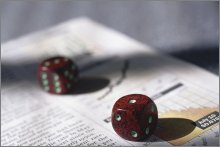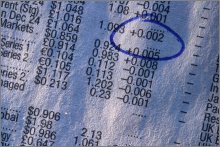Online Currency Trading Explained -- and Warned Against
by www.SixWise.com
If you're looking to get rich quick, the upsurge of online
currency trading Web sites like Forex.com and fxcm.com do
look tempting. They promise that you can "profit in both
rising and falling markets," benefit from "400-to-1
leverage" and win big in this "24-hour" market.
|

You may be better of trying your hand in Las Vegas
than dabbling in online currency trading, experts say.
|
How good of a bet is online currency trading, really? According
to the experts, not very.
What is Online Currency Trading?
Currency trading is done using the Foreign Exchange market,
which is also known as the "Forex" or the "FX"
market. The Forex is the largest financial market in the world,
with close to $2 trillion traded daily. (This, the trading
Web sites point out, is 30 times larger than the volume of
all other U.S. equity markets, combined.)
Speculators trading on the Foreign Exchange market simultaneously
buy one currency (such as the dollar, euro, or yen) and sell
another. The currencies are traded in pairs, such as the euro
and the US dollar, and more than 85 percent of trades involve
a handful of currencies known as "the Majors." (This
includes the U.S. Dollar, Japanese Yen, Euro, British Pound,
Swiss Franc, Canadian Dollar and Australian Dollar.)
|

Tiny fluctuations between currency values can create
huge profits -- or losses -- on the Forex. (Even Warren
Buffet lost nearly $1 billion on currency trading!)
|
Only about 5 percent of the Forex market's daily turnover
is due to companies and governments buying and selling products
in foreign currencies, or converting profits made in foreign
countries into domestic currency. That means that the other
95 percent is from speculation.
The Forex is, indeed, a 24-hour market, with trading beginning
in Sydney, Australia and moving around the globe to Tokyo,
London and New York.
What Makes Online Currency Trading Risky?
The Forex market gives traders 100-to-1 leverage (and some
Web sites say up to 400-to-1), which means if you put up $1,000
you get a $100,000 position. While this means you can potentially
make great profits from even small shifts between currency
values, it also means you can lose big time.
In fact, even Warren Buffet, one of the richest people in
the world, lost close to $1 billion on the Forex market in
2005 because he bet the dollar would drop, according to Money
Magazine.
The consensus among experts? Even though online currency
trading looks tempting, resist the urge. It's nothing more
than gambling, and safer investment options, like foreign
stock and bond funds, are out there.
Recommended Reading
Mutual
Funds: The Basics (That Most People Still Don't Know)
Roth
IRA: If You Don't Have One, Here's Why You Should Seriously
Consider One
Sources
Money Magazine, "Behind the Buzz.," March 2007,
p. 26
Forex.com
Global
Forex Trading